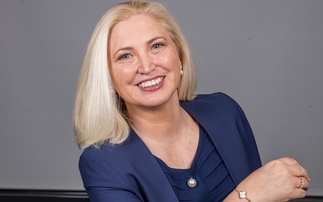George Saffaye of The Boston Company Asset Management1 considers which sectors could outperform given higher US household spending.
Healthcare, consumer discretionary and financials are among the sectors targeted for growth by the Boston Company US Opportunities strategy, according to senior portfolio strategist George Saffaye.
Of these, the consumer discretionary sector, accounting for around 8% of the strategy is expected to be a prime beneficiary of rising spending levels as US households continue to respond to improving fundamentals. However, consumer spending will not be broad-based, and many consumer stocks have seen valuations rise, so it is crucial to be selective.
"Consumers in the US are very different now than before the global financial crisis," says Saffaye. "They're far more circumspect in their spending." This has translated into lower household debt, which is "at multi-decade lows," while rising house prices have helped boost consumer confidence.
The decline in energy prices as the US becomes the world's ‘swing' oil producer has also helped, with home energy and fuel cost savings now being passed on to consumers.
Says Saffaye: "Consumers are not the volatile spending machine they were in the past. They're spending on the things they need but at a more considered level." At present, the fund's investment team highlights three areas that it expects to perform well in response to this more selective spending trend: automobiles, high-end fitness wear and media.
Revved-up auto sales
For the former, seasonally adjusted car sales are now averaging around 18 million annually, up from a low point of around 11 million during the global financial crisis, with fuel-thirsty sports utility vehicles selling particularly well as petrol costs fall.
A good way to tap into this trend, says Saffaye, has been to invest in a select group of technology companies that supply parts to the automotive industry, such as those that are involved in the development and production of newer technologies such as LEDs and sensors used in the latest collision avoidance systems.
Opportunities also lie within specialty retailers with strong tailwinds, such as a beauty retailer that provides salon products and services in the US. The company's strong end market and attractive demographic have enabled it to grow square footage and generate robust store comparatives that should lead to increasing sales and earnings growth.
Finally, Saffaye highlights opportunities in the media sector, where the fund owns shares in a television production company and a global online distributor. Here too, the investment case is boosted by rising levels of disposable income in the US and the potential for this to feed into the future profitability of these companies.
The strategy's largest holding is a well-known consumer-electronics and technology company, which the team expects to be a sizable beneficiary of consumer spending.
Mortgage market builds momentum
In financials (accounting for over 32% of the portfolio), the strategy retains an overweight exposure to regional US banks, which, says Saffaye, have been overlooked by the wider market. The investment team sees particular opportunity in well-capitalised banks with clean balance sheets and the ability to increase margins on their lending should US interest rates go up. Rising US house prices are also a positive for this sector, says Saffaye, given increased mortgage lending.
In health care, meanwhile, companies with a pipeline of remedies for globally significant diseases such as Alzheimer's "could be future game-changers," says Saffaye. He notes the sector has come under political pressure in recent months in response to media reports of excessive pricing but says he expects this to be a short-term phenomenon. "The reality is the US Food and Drug Administration wants companies to innovate, and that means them being able to recoup their costs to spend on the development of new treatments," he explains.
The strategy retains an underweight to the materials sector, with no exposure to oil and gas. Saffaye describes this as "a challenged area," but says the investment team will watch for opportunities. "We could consider investing in companies able to turn a profit in a world where oil is priced at US$50-per-barrel," he adds.
Turning to the global economy, Saffaye stresses the recent equity market correction was a reminder "that equities can be a risky asset." It looks increasingly likely that the US Federal Reserve will raise rates, he says, even as growth in the rest of the world looks anaemic. In Europe this means recovery, albeit a fragile one; while in China, investors are getting used to the idea of a maturing and slower-growth economy. Recent comments from China's president indicate that policy makers will accept slower growth of 6.5% over at least the next five years for China to meet its expectations of GDP and per capita income by 2020.
He adds: "It's interesting to see China mature as an economy as it transitions to consumer-led growth. That said, 50% of the economy is still dependent on government-led investment spend, so there's still that lack of correlation with the wider global economy and especially the US."
1BNY Mellon Investment Management EMEA Limited is the distributor of the capabilities of its investment managers in Europe (excluding funds in Germany), Middle East, Africa and Latin America. Investment managers are appointed by BNY Mellon Investment Management EMEA Limited or affiliated fund operating companies to undertake portfolio management services in respect of the products and services provided by BNY Mellon Investment Management EMEA Limited or the fund operating companies. These products and services are governed by bilateral contracts entered into by BNY Mellon Investment Management EMEA Limited and its clients or by the Prospectus and associated documents related to the funds.
Important Information
The value of investments and the income from them is not guaranteed and can fall as well as rise due to stock market and currency movements. When investments are sold, investors may get back less than they originally invested.
This is a financial promotion for Professional Clients. In Switzerland, this is for Qualified Investors only. This is not investment advice. In Germany, this is for marketing purposes only. Any views and opinions are those of the investment manager, unless otherwise noted. ICVC investments should not be regarded as short-term and should normally be held for at least five years. Portfolio holdings are subject to change, for information only and are not investment recommendations. This material may not be used for the purpose of an offer or solicitation in any jurisdiction or in any circumstances in which such offer or solicitation is unlawful or not authorised. This material should not be published or distributed without authorisation from BNY Mellon Investment Management EMEA Limited. BNY Mellon is the corporate brand of The Bank of New York Mellon Corporation. BNY Mellon Investment Management EMEA Limited is ultimately owned by The Bank of New York Mellon Corporation. BNY Mellon Investment Management EMEA Limited, and any other BNY Mellon entity mentioned] are all ultimately owned by The Bank of New York Mellon Corporation. Issued in the UK and Europe (ex- Switzerland) by BNY Mellon Investment Management EMEA Limited, BNY Mellon Centre, 160 Queen Victoria Street, London EC4V 4LA. Registered in England No. 1118580. Authorised and regulated by the Financial Conduct Authority. Issued in Switzerland by BNY Mellon Investments Switzerland GmbH, Talacker 29, CH-8001 Zürich, Switzerland. Authorised and regulated by the FINMA. Issued as at 01/12/2015. CP16583 - 01-06-2016 (6M)








 26 November 2024
•
4 min read
26 November 2024
•
4 min read



